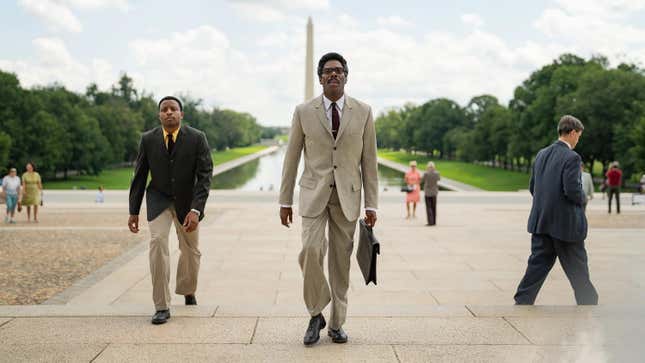
Bayard Rustin is not a household name in the same way that Martin Luther King, Jr. or John Lewis are in regards to the civil rights movement, though given the man’s contributions, he certainly should be. Credited with introducing Dr. King to the concept of non-violent resistance and for orchestrating the 1963 March on Washington, Rustin was a force within a movement that was nevertheless wary of him for his past Communist ties and unapologetic homosexuality, which made him a pariah among Black leaders seeking respectability for their movement. It’s no wonder, then, that writers Julian Breece (When They See Us) and Dustin Lance Black (Milk), and director George C. Wolfe (Ma Rainey’s Black Bottom), would wish to bring a story like Rustin to life. But as much as they succeed, there’s also a lingering sense that their examination better serves the man’s accomplishments than the man himself.
Colman Domingo portrays Rustin with eccentric bombast, a firecracker wit, and a tender longing that is extremely entertaining. After a prologue in which Dr. King refuses to stand up for Rustin’s continued involvement in the movement, leading to a rift between them, the film jumps ahead to 1963 when the ostracized Rustin ignites the grassroots effort to bring the largest peaceful protest in history to Washington, an event that would reunite him with King for the “I Have a Dream” speech.
The film shines brightest when it’s in frantic mode, its jazz soundtrack blaring as Andrew Mondshein’s occasionally overwound editing makes the act of arranging transportation, food, water, and financing for hundreds of thousands of people in a mere eight weeks into a spectacle. As a demonstration of the collective effort it takes to pull off such an event, the film effectively communicates Rustin’s leadership genius, as well as the hostility he faced from his supposed allies in the NAACP and from other Black leaders.
These performances of historical figures are a mixed bag in terms of quality, with CCH Pounder and Jeffrey Wright coming across especially well as Dr. Anna Hedgeman and Rep. Adam Clayton Powell, Jr., respectively. Meanwhile, Chris Rock fails to summon much acting acumen to differentiate NAACP executive secretary Roy Wilkins from, well, Chris Rock. However, the arguments and prejudices that define these characters make for compelling obstacles, and Rustin is more than happy to oblige in the catharsis of overcoming establishment forces in spite of such in-fighting.
Unfortunately, the examination of Rustin himself, particularly as a gay man, is left somewhat wanting. Though Rustin struggles with his fidelity towards lover and fellow activist Tom (Gus Halper) as he pursues civil rights leader Elias Taylor (Johnny Ramsey), this subplot fails to mine any substantive analysis of Rustin’s psyche beyond his desired sexual freedom.
Characters will constantly psychoanalyze Rustin through various lenses—with occasionally absurdly scripted justifications for doing so—but Breece and Black’s screenplay does not show us the man’s complications as much as it tells us with assurance that they exist. Domingo does a lot to give the role the necessary gravitas and dimension, but because he’s working within the script’s limited perspective, perhaps he restrained himself from speculating too hard about the man’s inner life. The result is a weaker portrait of a historical figure who is in desperate need of a stronger one.
Bayard Rustin deserves to be remembered for the entirety of his being, both as an activist and as an openly gay Black man in a time when it was criminal. As much as Rustin attempts to balance both, it carries the former better than the latter. At the very least, though, perhaps the name Bayard Rustin will be a bit more recognized in our collective memory.
Rustin opens in select theaters on November 3 and streams on Netflix beginning November 17